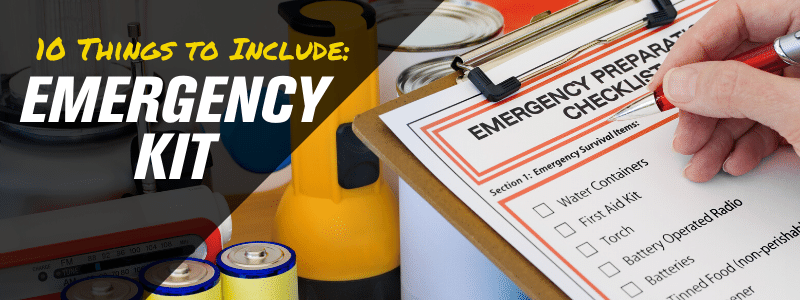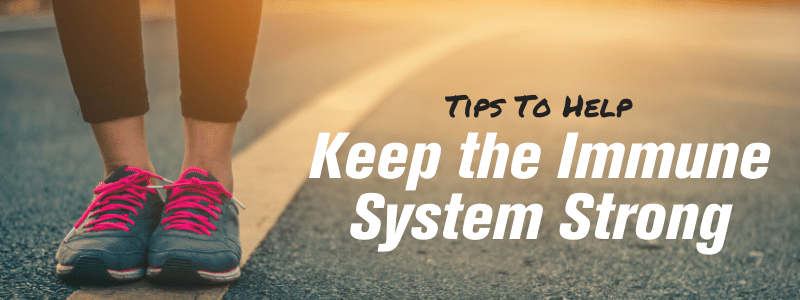10 Things to Include in an Emergency Home-Care Kit
- 10 Apr 2020

Here’s what professionals say you need to be ready for an emergency at home.
Let’s be honest, we don’t know what life can throw at us. Unexpected illnesses, wildfires, natural disasters, and more can happen anywhere and can hit without warning.
A lot of us have the same question — How can we be prepared to take care of ourselves and our loved ones in case of an emergency?

To help you navigate this complicated and somewhat stress-inducing question, we did some research and created a list of 10 things recommended you keep on hand in order to be prepared for an emergency.
What You Should Include

Food
This may seem obvious. BUT, if we are trying to prepare for an unknown and unexpected dilemma we can’t just throw a bunch of bananas in the basement and hope they don’t go bad.
You’ll want shelf-stable foods that don’t require any heat or refrigeration and are nutrient dense. We created a quick grocery list for you below.
Canned Goods that Don’t Need Heated
- Canned fruits & vegetables
- Tuna or other canned meats
- Canned beans and lentils
- Granola / Cereals
- Other canned/jarred goods (peanut butter, etc.)
- Can opener
Sustainable Resources
- Seeds
- Gardening supplies
Shelf-stable Nutrition & Hydration
More on this in #2-3 below.

Water
Hydration is key to human survival. Depending on the circumstances, we can only live about three to four days without water. Regardless, that would be three very uncomfortable days.
Stocking up on both cases of individual bottles and gallons of water would be ideal. The individual bottles would be good for transporting and the gallons for refills. If you’re looking to be more eco-friendly, add a reusable bottle for each member of the family and purchase gallons of water for refills.

Shelf-Stable Nutrition Supplements
Water doesn’t always cut it. Especially when you’re dealing with illness or extreme conditions. Adding electrolyte & protein replenishment supplements can be a game changer in these situations.
For electrolyte supplements, you’ll want to skip the artificial sweetener and high sugar filled sports drinks, and go for something all natural and clean to supply your body with the nourishment it needs. This is especially important if someone is ill with any flu-like virus. If they’re experiencing GI symptoms, these can be exacerbated by artificial sweeteners and large amounts of added sugars.
Having protein supplements on hand will be helpful if someone loses their appetite due to illness. Taking in protein is crucial to tissue regeneration and keeping the immune system properly functioning.
Protein supplements are also useful if you don’t have direct access to food. Protein powders are made to be shelf-stable, and can help curb your hunger.
Our Recommendations:
Electrolyte drink – :SPEED or :HYDRATE
Protein supplement – :REPAIR, :RAW, or :CUSTOM PROTEIN
Protein & nutrient fortified hydration – :RESTORE
Kick the sugar to the curb and get the most out of your hydration and protein supplements by purchasing from domestically-produced brands that use natural and clean ingredients.
You might also consider keeping multivitamin & mineral supplements as well. A simple daily multivitamin can help prevent serious nutrient deficiencies if your food supply is scarce and rationing comes into play.

First-Aid Kit & Medication
Unfortunately, preparing for the worst, means thinking about things we hope don’t happen. In the unlikely event that someone in your family was to get hurt, ill, or in need of medical attention during an emergency, it’s a good idea to have some tools on hand. We created a short list of helpful medical supplies for you below.
- Cough drops
- Ibuprofen/Acetaminophen
- Antacids
- Allergy Medication
- Band-aids
- Neosporin
- Hand sanitizer
- Thermometer
- Rubbing alcohol/hydrogen peroxide
- Moisturizing Lotion
- Chapstick
- Prescribed Medication
- Multivitamin & mineral supplements
If anyone in your household has a pre-existing allergy or medical condition, getting an extra refill of their current prescription medication may be allowed by your doctor.
A lot of stores offer pre packaged first-aid or medical care kits, check with your local pharmacy, grocery, or even local outdoor retailer to see if they have any available.

Entertainment
Having some accessible entertainment may not be essential or the only thing you’d grab out of your house in a fire, but it can definitely help you keep your sanity if you’re stuck somewhere for hours on end. Consider grabbing some games, books, toys, and other activities that your family enjoys, and adding them to your emergency bin.
- Books
- Games
- Deck of Cards
- Children's Toys
- Coloring Books
- Colored Pencils
- Notebook/Paper

Change of Clothing
We don’t want to imagine a scenario where we don’t have access to our warm beds, comfy clothing, and hot showers, but if we find ourselves in that scenario an extra change of clothes may really be a comfort that helps. We recommend adding the following:
- Outfit for each member of the family
- Towels
- Reusable diapers (if you have a little one)
Electricity & Technology
How did people live without technology? It seems relatively impossible in today's day and age. It has also become an integral part of our vital communication systems. So be sure you're prepared with backups of the essentials.
General Items
- Batteries
- Chargers
- Headphones
Power Outage
- Candles & Flashlight
- Backup power cell
- Solar charger
Toiletries
Picture this: you’re stuck on a deserted island with your mom who hasn’t brushed her hair in a week, your spouse who sweats more than anyone you know, your kid with braces, and you've only been able to use a stack of leaves for washing up… Whew. You’re going to wish you had some toiletries, trust us on this one.
- Toothbrush
- Toothpaste
- Toilet paper
- Wipes
- Soap
- Reusable rags
- Deodorant
- Hair ties
- Brush/Comb
In all seriousness, in case of a natural disaster, convenience stores may close down for weeks on end. It’s best to have back ups of these comfort items to stay clean and healthy.
Safety
Prepare to cut, dig, or protect yourself from various unexpected circumstances with the most universal precaution tools. Below is a list of classic survival tools that every household should have on hand.
- Radio
- Gloves
- Protective masks
- Knife/axe/machete
- Matches
- Rope
- Duct Tape
Miscellaneous
For families with pets, infants, or elderly living with them, there may be a few more things to consider adding based on their needs
- Paper towels
- Pet supplies
- Baby food/diapers/wipes/etc.
- Walker/wheelchair
You may want to add to this list, or shorten it down. Only you truly know what you and your family need, but hopefully this list helps start that process.
Give yourself a little peace of mind. Now is the time to build your own emergency kit so you and your family are prepared for whatever life may throw at us next.







